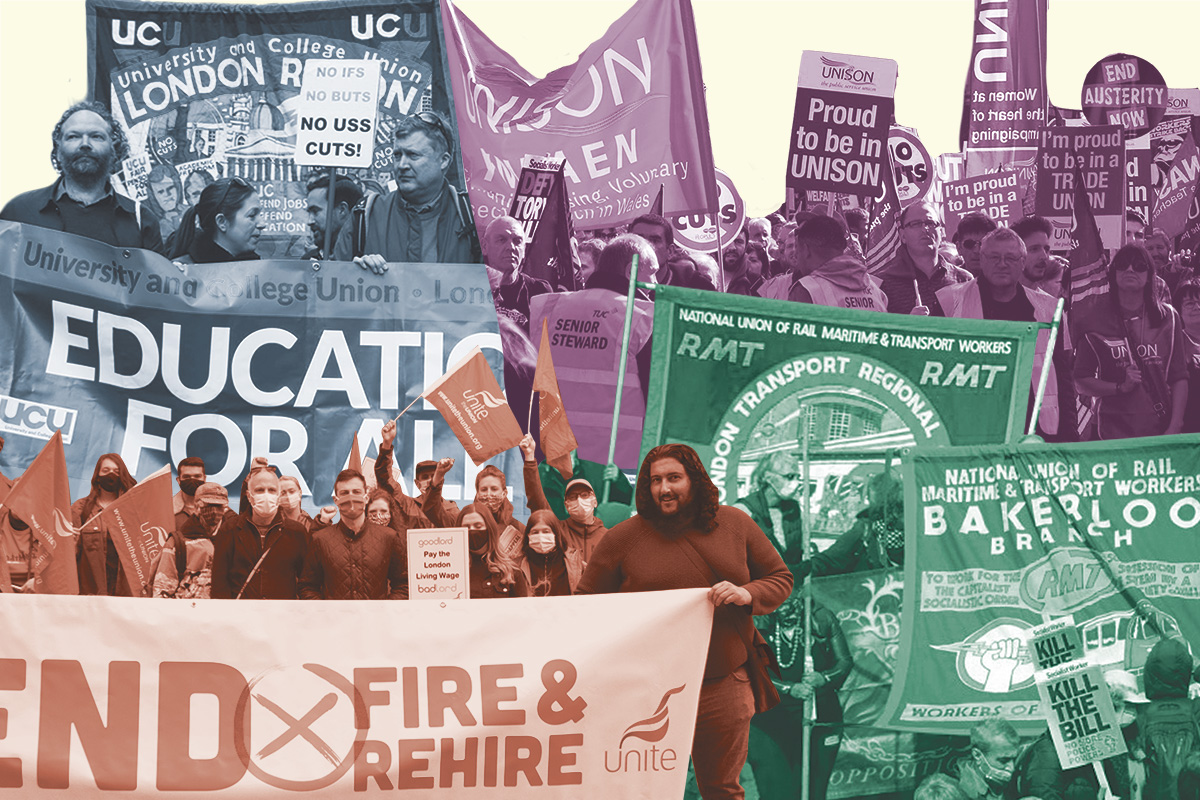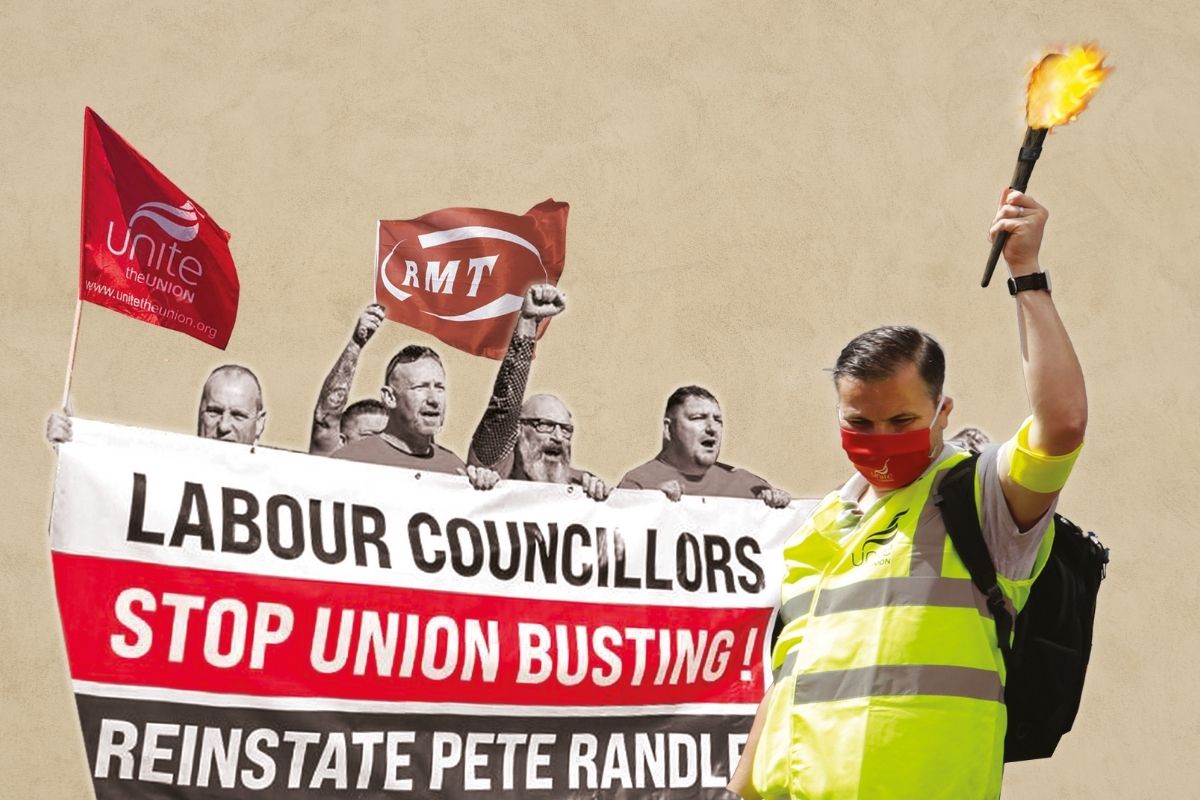Across Britain, the bosses are going on the offensive, attacking workers’ jobs, pay, and conditions in order to boost their profits. The gloves are off. The time for compromise is over. The unions must fight back with militant action.
Mass sackings. Fire and rehire. Victimisation. Deskilling. These are just some of the brutal methods being deployed by the bosses against workers as they seek to protect their profits above all else.
With the crisis of capitalism deepening, and inflation rampaging, big business clearly understands that the era of ‘compromise’ and ‘fair deals’ with the trade unions is well and truly over.
Instead, attacks on jobs, pay, and conditions are the order of the day, as the capitalist class looks to make workers shoulder the burden for the crisis.
But workers are not lying down in the face of the bosses’ offensive. Recent months have seen a wave of industrial unrest across Britain, with workers moving into action and turning to their unions in order to fight back.
In short, we are entering an era of class war – a war that will only intensify.
Fire and rehire

The recent ‘jobs massacre’ at P&O Ferries shows how far the bosses are willing to go to defend their profits.
Seeking to replace a skilled, unionised workforce with cheap, casualised labour, P&O bosses sacked almost 800 workers overnight.
Peter Hebblethwaite, chief executive of P&O, openly admitted to MPs that the company knew that this was illegal, since they did not bother consulting RMT or Nautilus, the unions organising the affected workers.
But these ruthless capitalists were more than happy to break the law in the interests of their profits.
This will come as no great surprise to class-conscious workers. The bosses flout laws and regulations in a thousand and one ways every day. They know that the courts are on their side, and that Lady Justice isn’t blind.
This mass sacking reveals the brazen attitude of the bosses. Unfortunately, in the absence of a concerted fight back – one that would have necessitated breaking anti-trade union laws – the vast majority of the sacked workers have accepted compensation payments.
This comes alongside numerous instances of the bosses utilising their now-favoured weapon of ‘fire and rehire’ against workers – a vicious tactic that is spreading like wildfire.
Recently, for example, Royal Mail has threatened to scrap almost 1,000 manager jobs, replacing these employees with workers on lower wages.
Similarly, workers at Valeo Foods’ factory near York, which produces confectionery, have been left with a less-than-sweet taste in their mouth after being threatened with fire and rehire, as the company seeks to scrap workers’ current contracts in favour of new ones based on worse terms and pay.
Victimisation
Should unionised workers dare to raise their head above the parapet, the bosses have shown that they are more than happy to rid themselves of ‘unruly’ shop floor activists. Such trade union victimisation has been rampant in recent months.
In the ongoing dispute at Goldsmiths University, for example, at the start of April, senior management sent an email to 16 members of staff, threatening redundancies. Included in the recipients were the co-president and treasurer of the Goldsmiths UCU branch, along with several other union reps.
This is unlikely to be a coincidence, given the militant battle being waged by the union against threatened mass redundancies and department closures at the university.
Another recent example of union victimisation is that of Nina Doran, a UCU rep at the City of Liverpool College (CoLC).
Last September, days before the CoLC UCU branch was set to strike, Nina was suspended from her job. She was eventually dismissed in March this year – the fourth rep at the college to receive such treatment in the last eight years.
Then there is the case of Pete Randle, Unite rep at Coventry City Council, suspended by his employers on trumped-up charges in the thick of the intensifying dispute between bin lorry drivers and local council officials.
There is also the case of Paul Holmes, dedicated rep at Kirklees Council for decades, and Unison President, who was dismissed earlier this year after being suspended for two years as part of a witch-hunt by the employers and the union right wing.
The start of the year also saw an outrageous assault on couriers organised with the IWGB in Hackney, London.
In the days following a protest by the riders against the local council, eight of the delivery drivers were arrested in an immigration raid, and 22 of their mopeds were seized by the police.
The timing of these attacks is unlikely to be a coincidence, revealing the true role of the state’s bully boys in blue.
Deskilling and undercutting

Another, more stealthy, weapon in the bosses arsenal is undercutting nationally-agreed pay, terms, and conditions.
This is the background to recent events at the Hinkley Point C construction site, with hundreds of workers taking unofficial action at the start of April. In what was effectively a wildcat strike, the workers downed tools to demand an improvement in their working arrangements.
They demanded that wage rates for workers in similar trades should be equal across different agreements. And they also called for joiners employed on the site to be properly trained, skilled workers, not untrained workers on lower wages.
These issues stem from the fact that many jobs at Hinkley Point C fall outside of nationally-agreed terms and conditions, such as the NAECI (National Agreement for the Engineering Construction Industry). These contracts were agreed between bosses and union bureaucrats, undercutting pay and conditions, whilst also deskilling certain trades.
The Scunthorpe scaffolders strike was triggered for similar reasons, as a result of the workers not being paid the NAECI rate of pay.
There are rumours that this dispute has now been settled with a pay out. If true, this unfortunately leaves the door open for future workers to be similarly underpaid by the bosses, undermining jobs in the whole sector. Such salami-tactics must be fought.
Struggles sharpening

Taken together, these examples send workers a clear signal: as far as the bosses are concerned, the gloves are off. There can be no more ‘business as usual’.
Right-wing union officials and leaders, however, are accustomed to an era of class collaboration; a time when they could sit round the table with employers, in order to reach a compromise with big business and their political representatives.
Such a mentality was epitomised by Frances O’Grady, the TUC general secretary, who recently announced that she would be stepping down later this year; and even, to a certain extent, by the previous McCluskey-Turner left leadership in Unite, which was rejected by grassroots members in the union’s general secretary elections last summer.
But the bosses are no longer interested in entertaining such negotiations and niceties. Instead, the capitalists have shown that they are more than willing to break the law and wage an all-out assault on jobs, pay and conditions – and even on the unions themselves.
Accompanying this bosses’ militancy has been the resurgence of militant trade unionism in Britain. Many left-led unions, such as Sharon’s Graham’s Unite, are actively backing their members in their struggles to win above-inflation pay deals or resist redundancies. This is a welcome development.
But the trade unions will continue to be tested as the class struggle sharpens and the crisis of capitalism bites down ever-harder on the working class.
Increasingly, therefore, trade union leaders will be posed with the question of whether to ‘break the law or break the poor’, as the limits of legal industrial action are reached.
Weapons of revolution

The leaders of the labour movement must grasp that we have entered a ‘new normal’. Capitalism is in a severe crisis. Workers are struggling to keep a roof over their heads and put food on the table. Not reforms, but counter-reforms are on the agenda across the world.
Writing in 1940, in the middle of the Second World War, Trotsky aptly summarised the position of the trade unions in a similar epoch of deep capitalist crisis:
“The trade unions of our time can either serve as secondary instruments of imperialist capitalism for the subordination and disciplining of workers, and for obstructing the revolution; or, on the contrary, the trade unions can become the instruments of the revolutionary movement of the proletariat.”
This is the choice before the trade unions today. The bosses have stepped up their attacks. They are prepared to resort to criminal methods in defence of their profits and privileges. The trade unions must respond in kind, and fight fire with fire.
Individual, defensive struggles over jobs, pay, and conditions must be brought together, coordinated, and turned into a workers’ offensive against Tory austerity, privatisation, and the bosses’ attacks.
Workers – united, organised, and mobilised – must use their collective strength to break the shackles of the anti-trade union laws, and deal a knockout blow to this rotten Tory government.
Struggles over day-to-day demands must be generalised and linked to the overthrow of the capitalist system. And in this process, a Marxist leadership must be built in the trade unions, bringing together the most determined and resolute layers of the movement.
Only in this way can we end exploitation and misery once and for all, and establish a socialist society in which the working class is in power.






